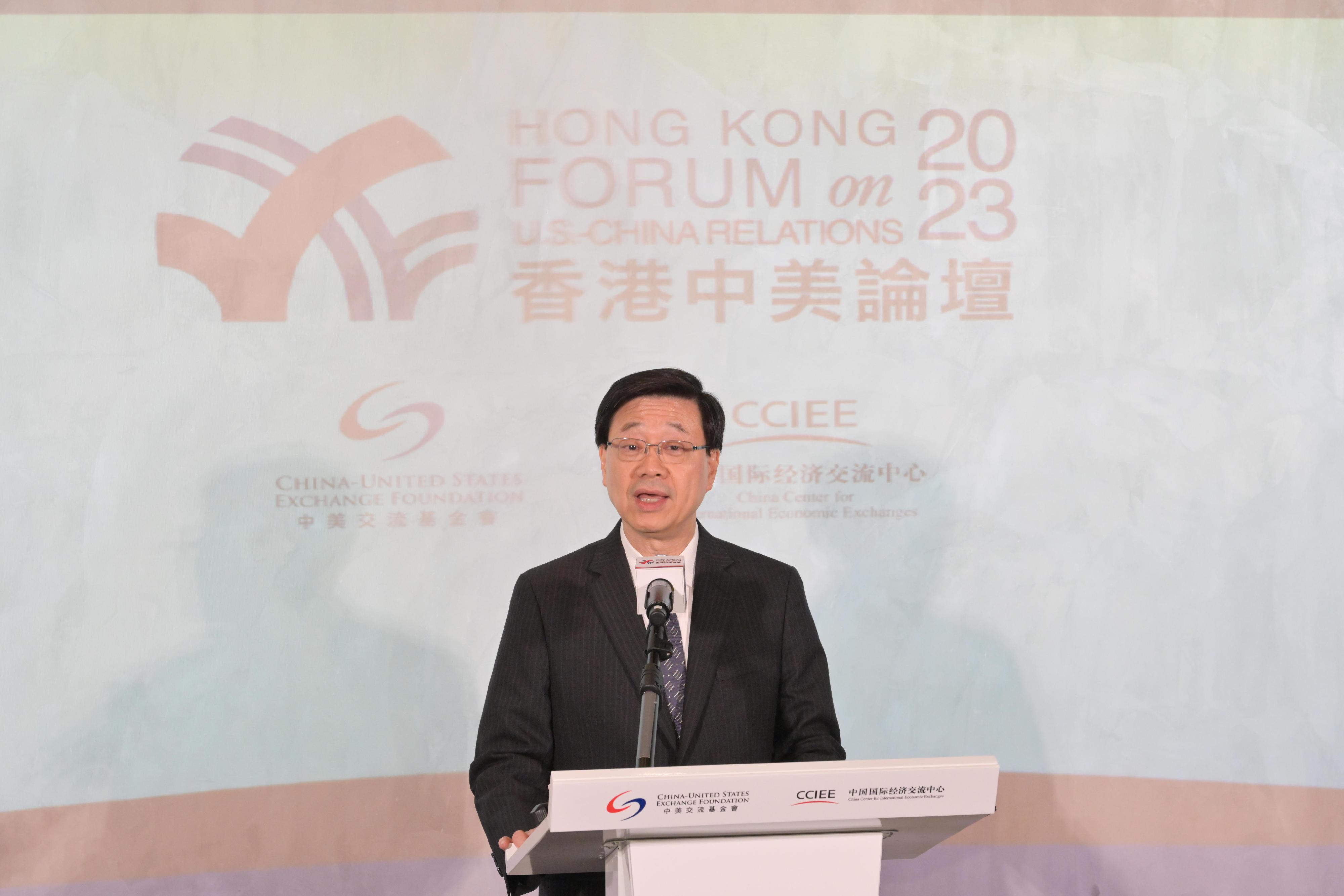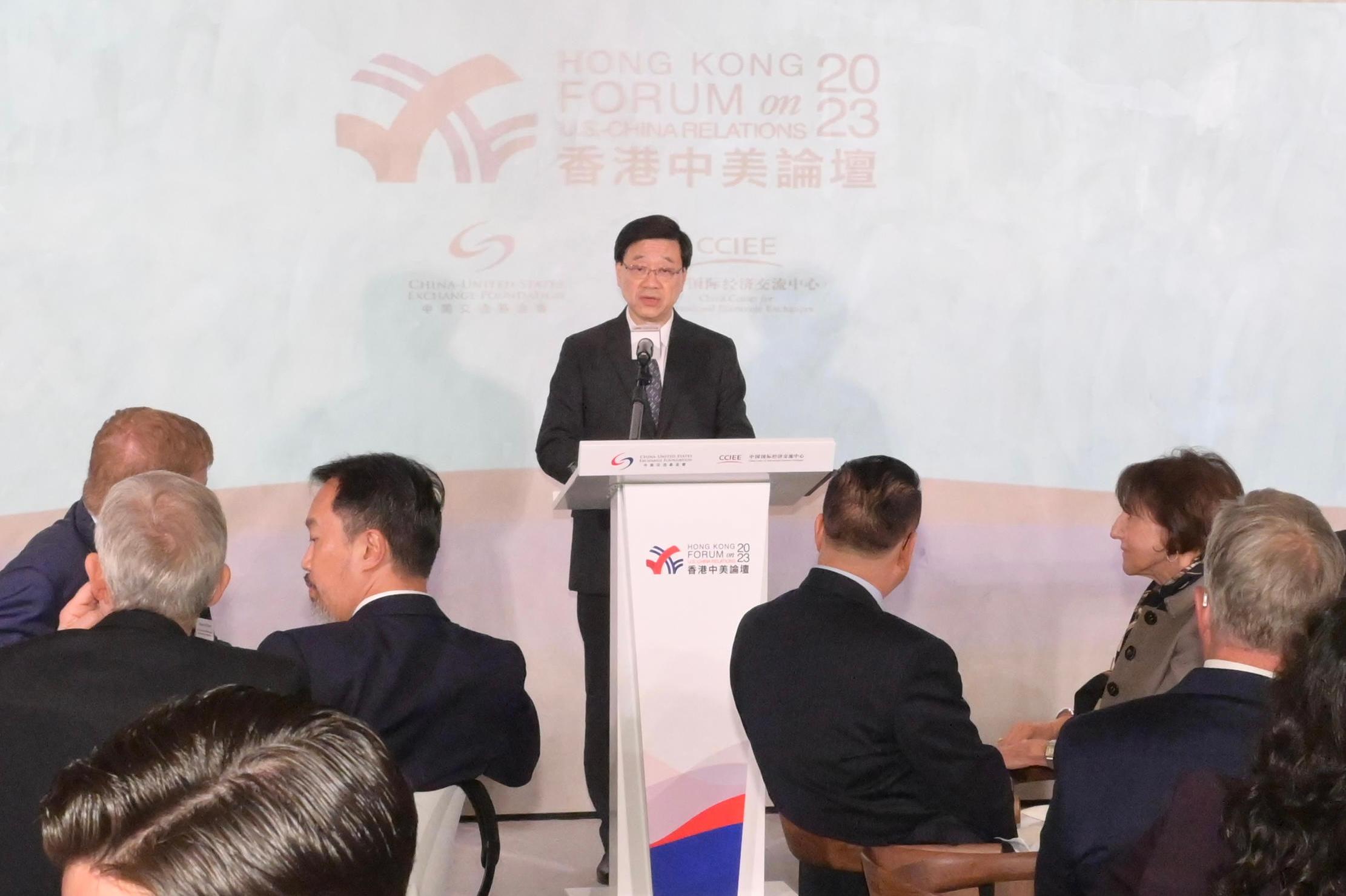Speech by CE at Hong Kong Forum on US-China Relations 2023 Welcome Dinner (English only) (with photos/video)
******************************************************************************************
Deputy Director Liu Guangyuan (Deputy Director of the Liaison Office of the Central People's Government in the Hong Kong Special Administrative Region (HKSAR)), Acting Commissioner Li Yongsheng (Acting Commissioner of the Office of the Commissioner of the Ministry of Foreign Affairs of the People's Republic of China in the HKSAR), Mr John Zhao (Chairman of the China-United States Exchange Foundation), Mr Bi Jingquan (Executive Vice Chairman of the China Center for International Economic Exchanges), ladies and gentlemen,
Good evening to you all! It's a pleasure to be here tonight, with you, to have this welcome opportunity to address the Hong Kong Forum on US-China Relations. Before I start, I echo something that was said earlier: Hong Kong is a special place under the "one country, two systems" principle, which I will explain later. But there are several DNAs that belong to Hong Kong that will never change. This is the place where you work hard and play hard. This is the place you can enjoy and be yourself.
I'm delighted to see that a number of you have flown in from the United States, from Europe, Asia and Australia.
Your presence today, and tomorrow, is compelling testimony to the value of the China-US Exchange Foundation, and this Forum, in bringing together high-level, highly respected, leaders – from government and the diplomatic corps, business, academia and more.
I take heart in knowing that each and every one of you is working to revitalise the connections that have long blessed Hong Kong-US relations. Working, as well, to refresh, to rekindle, the ties between China and the US.
I take heart, too, in this comment, from Confucius. "A gentleman," said the philosopher and teacher, "seeks harmony, not conformity." In Chinese, 和而不同.
More than an honourable objective, I believe it has become an essential one. In today's hyper-complex world – a world replete with conflicting governments, economies, peoples and goals – the need to seek common ground, while reserving our differences, has never been more acute.
And President Xi Jinping, speaking last month in Beijing at the Belt and Road Forum for International Cooperation, had this to say: "Viewing others' development as a threat, or taking economic interdependence as a risk, will not make one's own life better or speed up one's development (把別人的發展視為威脅,把經濟相互依存視為風險,不會讓自己生活得更好、發展得更快)".
The US and Hong Kong have a long history of co-operation. Of finding common ground, and mutual rewards, in trade and investment, education, culture and people-to-people ties.
Indeed, 2023 marks the 180th anniversary of the United States' diplomatic presence in Hong Kong. Our ties, ladies and gentlemen, are deep.
Trade has long galvanised those ties. The US trade surplus with Hong Kong is the second-largest among all its trading partners in the world. Last year, it was valued at over US$ 21 billion. The US is also among Hong Kong's largest sources of foreign direct investment.
We share many values, too, from the rule of law to the free flow of capital, goods and talent, freely convertible currencies, and open and free markets.
These values and advantages that Hong Kong enjoys are, of course, enshrined in the Basic Law.
What distinguishes Hong Kong is our "one country, two systems" principle. This framework ensures that Hong Kong enjoys the unwavering support of the country. China's national initiatives create far-reaching opportunities for Hong Kong – and the companies and economies that partner with us.
It also means that Hong Kong's common law system – the only such jurisdiction in China – will continue to reassure companies and investors from around the world.
Come to think of it. Most of the leading international financial centres around the globe practise the common law. In that sense, Hong Kong speaks the same, familiar language that gives easy and comforting confidence to global investors.
Hong Kong ranks third in Asia in the rule of law, according to the World Bank Group's Worldwide Governance Indicators.
In this year's "Rule of Law Index", published by the World Justice Project, Hong Kong placed 23rd out of some 140 countries and jurisdictions. That means Hong Kong is among the top 20 per cent in regard to the rule of law. Hong Kong also scored higher than some countries in Europe, and the US. I mention this not to be complacent – we always want to be the number one. I say this because when some people criticise us, they should look at their ranking in the Project.
Some people have asked: What are the standards of rights and freedoms enjoyed in Hong Kong? Good question. The answer is clear and straightforward. They are international standards. They are governed by the provisions of the International Covenant on Civil and Political Rights and the International Covenant on Economic, Social and Cultural Rights as applied to Hong Kong, and so enshrined in the Basic Law.
The people of Hong Kong have always enjoyed these rights and freedoms. The Hong Kong SAR Government endeavours to ensure this crucial attribute is firmly upheld.
Besides the Government, who else is protecting the enforcement of these rights and freedoms in Hong Kong? The answer is also clear and straightforward. The courts of Hong Kong at all levels, and most significantly, the Court of Final Appeal.
Yes, Hong Kong courts exercise their judicial power independently, free from any interference.
Our Court of Final Appeal is vested with the power of final adjudication. We have overseas judges sitting on the Court of Final Appeal. Currently, 11 eminent jurists from the United Kingdom, Australia and Canada serve as non-permanent judges of the Court of Final Appeal.
I take pride in our judiciary and its exercise of judicial power independently. So you can well understand why this speaker, and many individuals in the Hong Kong SAR Government, and indeed many across the community, found it absolutely unacceptable and outrageous for some Members of the US Congress to seek to impose sanctions on Hong Kong judges, prosecutors and other government officials.
Our judiciary exercises its power independently and in accordance with the law. Any suggestions otherwise are, at best, political grandstanding and, at worst, a base attempt at intimidation, at blackmailing. And without a doubt, a smear campaign, a political campaign to attack China and its Hong Kong Special Administrative Region.
The world knows about Hong Kong's long tradition in the rule of law. You are the best referee in this regard. You can see it as you walk in Hong Kong, work in Hong Kong or live in Hong Kong. Seeing is believing.
Ladies and gentlemen, security and stability are central to the success of every country, every economy. Hong Kong included. In 2019, Hong Kong's stability came under serious threat as a result of riots and violence. Today, our streets are peaceful and the doors of our shopping malls are widely and safely open once again to the people of Hong Kong, to travellers and to businesspeople from all over the world, and for you as well. So tonight after dinner, do take a walk in the shopping mall, spend your money, help the economy, contributing to the wellbeing of Hong Kong as well.
The International Monetary Fund, earlier this year, reaffirmed Hong Kong's standing as an international financial centre. And Hong Kong remains among the world's most competitive economies, this year ranked seventh, globally.
In my Policy Address, last month, I announced a range of measures to support our economy and to expand our reach, building new markets and expanding longstanding ties – from the 10 member states of ASEAN (Association of Southeast Asian Nations) to the Middle East.
Thanks to the Basic Law, Hong Kong remains a separate customs territory.
We have signed free trade agreements (FTA) with 20 economies and investment agreements with 32 economies, and there will be many more to come. We also strive for early accession to the Regional Comprehensive Economic Partnership, the world's largest FTA.
The Basic Law also authorises Hong Kong to continue, since 1997, as a full and separate member of international organisations such as WTO (World Trade Organization) and APEC (Asia-Pacific Economic Cooperation). At last count, Hong Kong, China is a member in over 230 international organisations and conferences not limited to states.
Over 530 bilateral agreements we have signed with different countries, regions and international organisations are currently in force. As for multilateral agreements, some 260 of them are in force and applicable to the Hong Kong SAR.
Our wide and international network enables us to keep doing what we are good at: bridging between the Mainland of China and the rest of the world.
This week, a host of international and high-powered events showcasing the strengths of Hong Kong and fostering collaboration between our country and the world has filled up the calendar of Hong Kong, Asia's World City.
An immediate example is this very prestigious forum before us today. The Global Financial Leaders' Investment Summit and the United Nations Commission on International Trade Law Asia Pacific Judicial Summit just concluded over the past two days. Both highly successful events, with a great turnout from the authorities and businesses of Hong Kong, the Mainland and overseas.
Hong Kong continues to play an important role in strengthening regional co-operation. That is why Hong Kong will certainly be present at the APEC Economic Leaders' Meeting in San Francisco next week. My Financial Secretary Paul Chan will be attending on my behalf, to represent Hong Kong, China and contribute to policy discussions under this year's theme, "Creating a Resilient and Sustainable Future for All". I count on Paul to do a very good job on my behalf.
Ladies and gentlemen, as I said at the very beginning, "A gentleman seeks harmony, not conformity." Hong Kong, thanks to our deep-rooted Chinese culture, is always a strong advocate for peace and harmony. When it comes to Hong Kong-US relations, if one sets aside all the domestic political interests, it should be pretty clear that there's much potential for stronger economic and trade ties between Hong Kong and the United States.
I take encouragement in noting that several US companies were among the 30 strategic companies that have agreed to set up or expand their businesses in Hong Kong through OASES, our Office for Attracting Strategic Enterprises.
Working together, we have much to gain. In business and investment, and equally so in the arts, culture and entertainment.
Those of you who managed to get tickets to Yo Yo Ma's performances earlier this week here can attest to that. And I'm sure those who saw the Hong Kong Ballet on its US tour, earlier this year, would also wholeheartedly agree.
My thanks to the China-US Exchange Foundation, and the China Center for International Economic Exchanges, for organising this timely and invaluable international gathering.
I know the China-US Exchange Foundation is celebrating its 15th anniversary this year, and I offer my best wishes for your continued success down the road, of change and progress. I must thank you for giving me this opportunity to meet all the wise brains and minds, and the driver of the constructive US-China relations. This important relation, which needs nobody to highlight the importance of, is for the wellbeing of this world, for the long-term prosperity of mankind, and simply, for what is right for the people of this world.
I know you will enjoy the Forum, and I wish you all the best of business, and co-operation, in the coming year.
Thank you very much for giving me this opportunity. Thank you.
Ends/Thursday, November 9, 2023
Issued at HKT 20:13
Issued at HKT 20:13
NNNN





